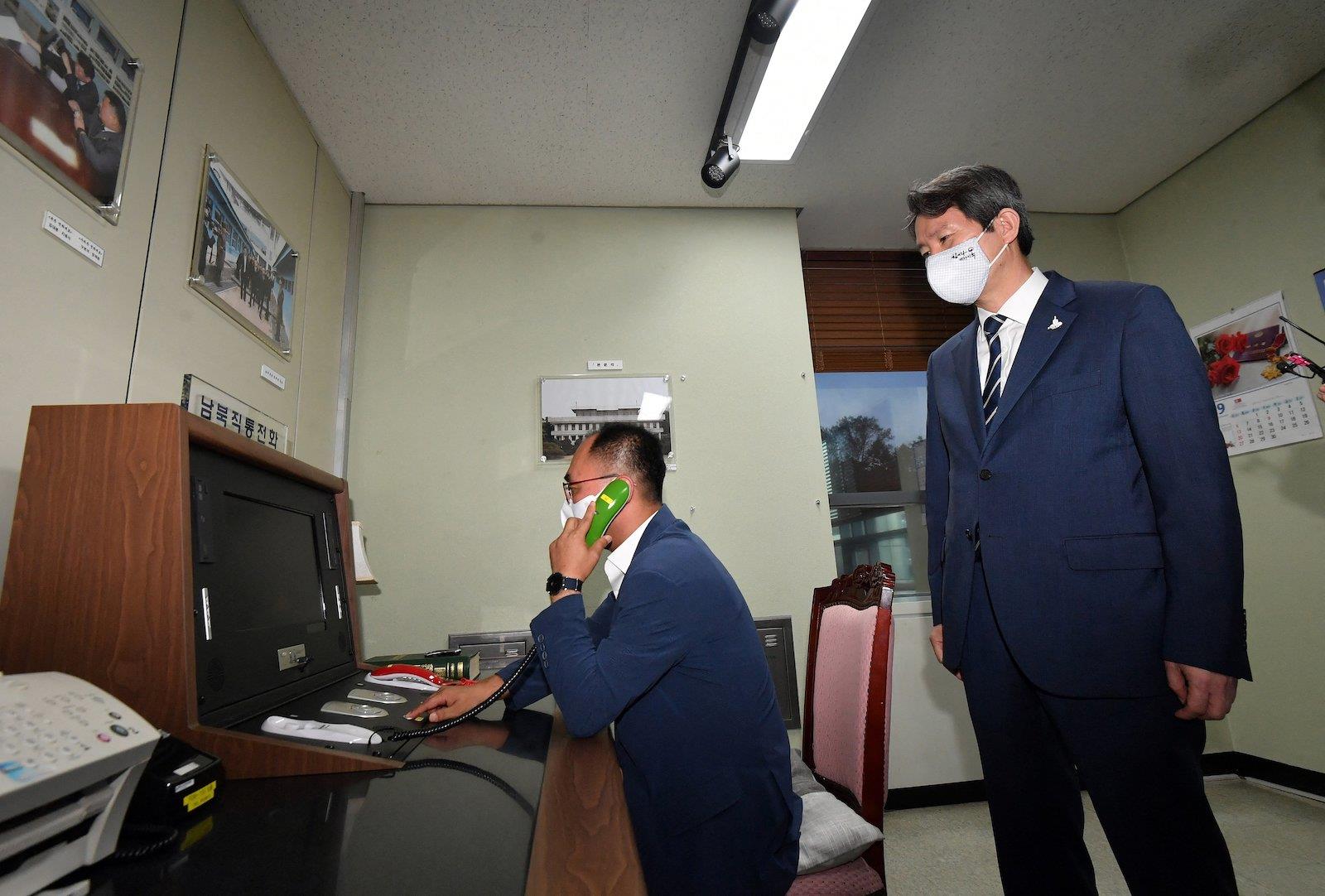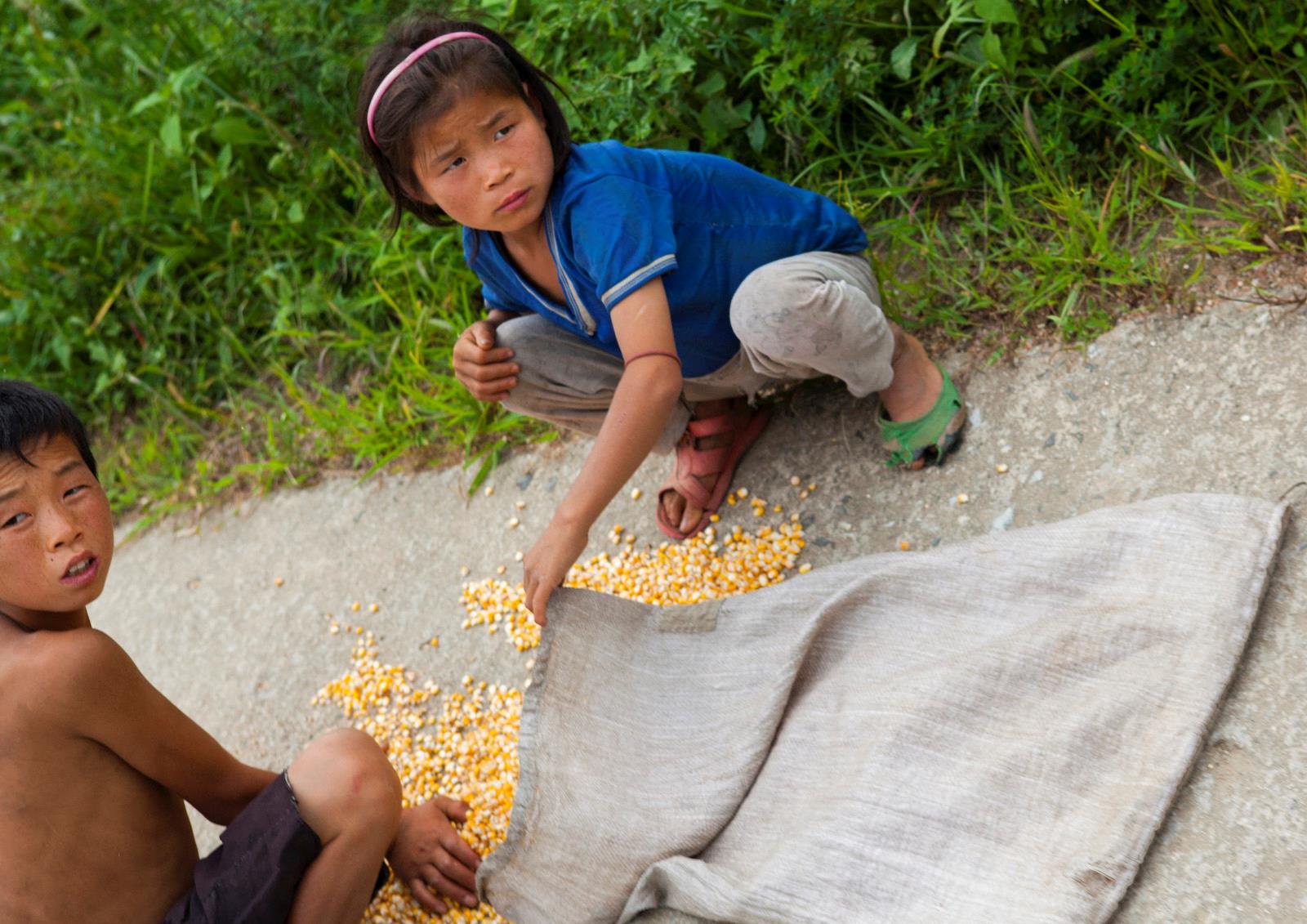(MENAFN- Asia Times) The restoration of hotlines across the Demilitarized Zone could be a precursor to improved relations between the two Koreas, but could also signal wider geopolitical machinations aimed at Washington.
The move, which broke the ice of a year of frigid relations between Seoul and Pyongyang, is generating considerable expectations in Seoul, as well as multiple analyses.
North Korea is hard hit by food shortages, and South Korean President Moon Jae-in is keen to restart inter-Korean relations before his term ends next spring. This alignment between the two Koreas, and any resultant improvement in relations, could put pressure on Washington to talk to Pyongyang.
Let's talk The phone and fax lines were reconnected on July 27, the 70th anniversary of the signing of the armistice that ended Korean War hostilities in 1953 leading to an uneasy peace – albeit one punctuated by multiple deadly incidents, from commando clashes to terrorist attacks to naval sinkings.
Asia Times understands that multiple lines across the Demilitarized Zone separating the two Koreas have been reconnected 13 months after the North disconnected them amid high tensions.
Two lines run along the so-called eastern and western transportation corridors, where currently unused road and rail lines cross the DMZ. Another is the Red Cross hotline, in the truce village of Panmunjom. And another runs from the South's Unification Ministry to – or near – the Joint Liaison Office.
That building, which formerly operated as an office for both Southern and Northern officials near the North Korean city of Kaesong, was blown up by North Korea last June in a protest against the launch, by activists in the South, of balloons carrying propaganda messages across the DMZ.
Another hotline that runs to Pyongyang, operated by the South's National Intelligence Service, was never disconnected.

South Korea's Unification Minister Lee In-young (right) looking at the inter-Korean hotline during a visit to the south side of the truce village of Panmunjom in the Demilitarized Zone (DMZ) dividing the two Koreas. – North and South Korea have agreed to restore their severed communication links, the South's presidential office said on July 27, 2021. Photo: AfP / Park Tae-hyun / KOREA POOL
Letters have been exchanged by the leaders of the two Koreas since April, and Asia Times has learned that there is also an email channel linking Seoul and Pyongyang.
For Pyongyang, the operation is simple.
Reopening hotlines requires only“sending a communications guy from Pyongyang down to the office near the DMZ – or just telling the guy in the office that he can now pick up the phone,” said Daniel Pinkston, a Seoul-based international relations specialist at Troy University.“It is basically costless.”
Still, the move has electrified the South, and senior officials have talked up the potential of the hotline reconnections.
“This is only the beginning,” Unification Minister Lee In-young said in a Facebook post that was picked up by news media .“I will work harder for the Kaesong Industrial Complex, the reunion of separated families and others.”
The Kaesong Industrial Complex was a joint, inter-Korean manufacturing complex that was closed down by the administration preceding the engagement-centric Moon Jae-in government, which has sought to re-open it.
Politics of aid Analyses have speculated that the hotline reconnection could be a forerunner to a request by the North for humanitarian assistance from the South.
Multiple reports , citing citizens inside the country who use illegal smartphones to speak to media organizations in Japan and South Korea, indicate that the North is wracked by a food shortage.
North Korean has plentiful experience with food crises: A famine in the early-mid 1990s is believed to have killed hundreds of thousands. The country suffers from food insecurity for climatic and topographical reasons, which have in the past been exacerbated by wrong-headed agricultural policies.
The advent of a basic market economy since the 1990s is believed to have ameliorated matters by improving both supply and distribution. But several factors may be making matters worse yet again.
The country is heavily sanctioned by the international community, and like other nations, is suffering from the pandemic conditions of Covid-19. In response to the disease, the country has closed its borders, which has massively affected trade, and domestic markets.
Looked at from Pyongyang, as well as these“push” factors, there is a“pull” factor south of the DMZ.
South Korean President Moon has been strongly pro-engagement since taking office in 2017, but is now nearing the end of his single term, with a presidential election slated for March 2022.

North Korean children collecting fallen corn on the road in the countryside, North Hwanghae Province, Kaesong, North Korea. Photo: AFP / Eric Lafforgue / Hans Lucas
“Moon has been consistent on engagement but is now a lame duck, so now is a good window for bargaining,” said Pinkston.
This means, for Kim, the present“is a good time to gain concessions and assistance,” Pinkston said.
Moon and his officials have repeatedly stated their willingness to offer aid to North Korea. But in the often bizarre politics of the peninsula, granting South Korea permission to offer aid to North Korea is widely seen as a concession by the North to the South.
“North Koreans tend to use access as a reward; they consider assistance a form of exchange and a kind of reward for the giver,” said Go Myong-hyun, a research fellow at Seoul's Asan Institute, a think tank.“That is how they manage NGOs, and that is how they manage South Korea: Even though South Korea is lending assistance to North Korea, North Korea plays hard to get as they have backup options – China and Russia.”
In addition to food aid, South Korea could feasibly offer medical aid if and when North Korea receives vaccines from the World Health Organization's Covax, or other sources.
“They don't have the cold storage facilities for vaccines so that could be very humiliating,” Pinkston said.“If the South Koreans could quietly support them with the logistics, that would be a good outcome.”
Political maneuvers Joint military exercises between South Korean and US forces – which customarily infuriate North Korea – are scheduled for August.
“I think this is a North Korean ploy to delay or scale-down the upcoming joint exercises,” Go said.
The reconnection of the hotlines also offers a potential pressure relief valve if tensions do arise during the drills. But there may be a wider strategic game in play.
“Even in North Korea it is nice to have options and they have the option of using inter-Korean relations as leverage on the US, especially on Biden, who is clearly not that interested in North Korea,” Go said.“I think that is why they chose the option of inter-Korean dialog, rather than relying on provocations.”
In 2018, the year North Korean leader Jong Un came out of isolation and embarked upon a program of global summitry, South Korea played an intermediary role in enabling Kim's unprecedented meeting with then-US President Donald Trump.
Pyongyang may now hope for the same from Seoul.
One North Korea watcher who spoke to Asia Times on condition of anonymity suggested that much of the laudatory commentary stemming from the hotline reconnections was a means of pressuring Washington to step up.
“North Korea did not commit to any grand events or meetings or summits,” the expert opined.“I think it is the Blue House [the presidential office] who are saying this.”
“Every time State Department officials come here, the Blue House says it is about North Korea, but it is not,” the expert said.“It is clearly about China, and about Seoul-Tokyo relations.”
Nevertheless, the talk-up of the possibilities of improved inter-Korean relations applies subtle leverage on Washington.
“I think that by putting so many expectations out, the Blue House is forcing the Biden administration to respond,” he said.
MENAFN29072021000159011032ID1102535771